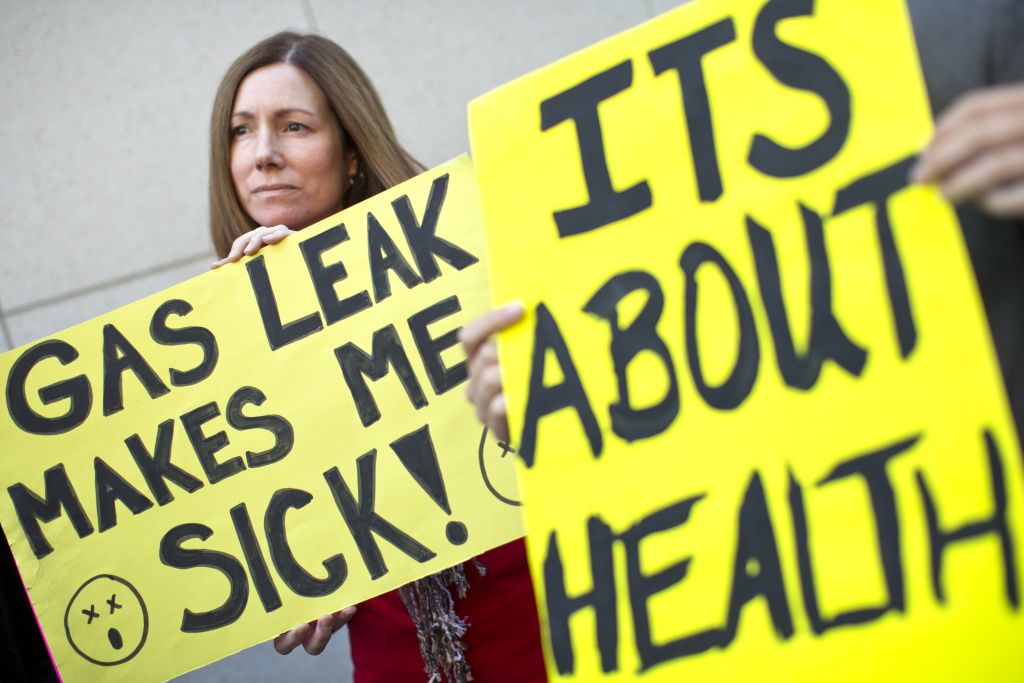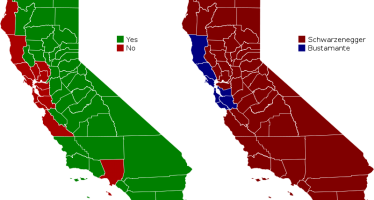Brown declares emergency over gas leak
 Gov. Jerry Brown has intervened as activists, analysts and residents decried a massive ongoing leak in a Los Angeles-area gas pipeline. “More than two months after a natural gas leak began emitting large amounts of a greenhouse gas near a wealthy neighborhood here, Gov. Jerry Brown declared a state of emergency on Wednesday, ordering California agencies to move as quickly as possible to resolve the issue after previous attempts to stem the flow of methane failed,” the New York Times reported.
Gov. Jerry Brown has intervened as activists, analysts and residents decried a massive ongoing leak in a Los Angeles-area gas pipeline. “More than two months after a natural gas leak began emitting large amounts of a greenhouse gas near a wealthy neighborhood here, Gov. Jerry Brown declared a state of emergency on Wednesday, ordering California agencies to move as quickly as possible to resolve the issue after previous attempts to stem the flow of methane failed,” the New York Times reported.
“In declaring the state of emergency, Mr. Brown — who has been criticized by many residents for his slow reaction to the problem — reiterated all the state has been doing to help plug the leak and monitor air quality, as well as the state’s efforts to make sure the gas company paid for disruptions and damage caused by the leak,” the Times added.
An environmental mess
The disaster afflicting Porter Ranch, one of Los Angeles’s newest communities, has broken unflattering environmental records. Already “the largest recorded natural gas leak in California’s history,” according to the Independent, the leak has been “expelling an estimated 110,000 lbs of methane into the atmosphere every hour: about a quarter of the state’s daily methane gas emissions.” Tim O’Connor, California director for the Environmental Defense Fund’s oil and gas program, told the Independent that the leak was “far greater than the BP Deepwater Horizon disaster” in its aggregate impact on greenhouse gas emissions.
Southern California Gas has conceded that its own judgment may well have been to blame for the breach. In a statement, the company revealed “it decided nearly 40 years ago against replacing an underground safety valve that could have cut off the gas leak when the storage tank first erupted in late October,” as the Fiscal Times observed. “Executives of Southern California Gas apparently concluded it was too hard to find replacement parts for the valve and that the underground storage tank wasn’t close enough to homes to warrant the time and expense. Instead, they gambled that the cutoff valve would never be needed. Now they are struggling to contain runaway greenhouse gas emissions that could cost them hundreds of millions of dollars in damages and greatly contribute to climate change.”
Fumes and fury
The news has compounded outrage and frustration in Porter Ranch, where Southern California Gas has moved to help residents cope with — or flee — the fumes. “This is the biggest community and environmental disaster I’ve ever seen, bar none,” Mitchell Englander, the neighborhood’s representative on the Los Angeles City Council, told Bloomberg. “Life there is not on hold — it’s on the edge and it’s on the brink of pandemonium. People are living with fear, uncertainty and doubt.” What residents remain have been plagued by discomfort and illness.
“A shopping center by the freeway still bustles, but the longest lines are at a storefront that Southern California Gas established to assist residents with relocation, health problems, air-filtration systems and claims. The smell of chemicals added to natural gas — which itself is colorless and odorless — pervades the air. Homes of residents who’ve already received relocation assistance sit vacant, while signs warn of increased police patrols to ward off looters. Some residents and visitors wear gas masks.”
Health officials have issued reassurances that residents’ symptoms, including dizziness and vomiting, were only temporary.
Gov. Brown himself arranged to meet neighborhood representatives. Paula Cracium, president of the Porter Ranch Neighborhood Council, told the Los Angeles Times “she and others at the meeting urged Brown to be more visible on the issue and to help with a major concern that will last long after the leak is plugged — declining property values.”
Related Articles
Top 10 quotes from the 2003 Gray Davis recall
October 7 marks the 10-year anniversary of the recall of California Gov. Gray Davis. The 2003 recall brought a
CA farmers finally win on federal water bill
California’s beleaguered farmers had their hopes for a better 2017 rekindled as landmark water legislation delayed for years finally passed
California Was Impervious To Change
This article was first published in City Journal. NOV. 4, 2010 By STEVEN GREENHUT No state is in a bigger




